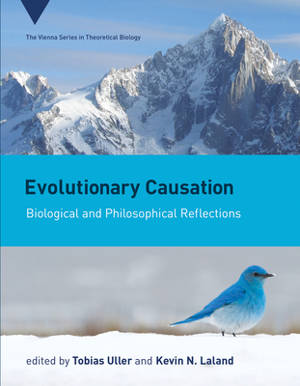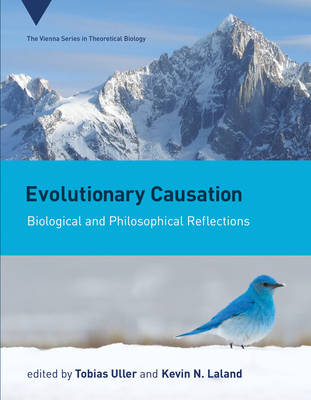
- Afhalen na 1 uur in een winkel met voorraad
- Gratis thuislevering in België vanaf € 30
- Ruim aanbod met 7 miljoen producten
- Afhalen na 1 uur in een winkel met voorraad
- Gratis thuislevering in België vanaf € 30
- Ruim aanbod met 7 miljoen producten
Zoeken
Evolutionary Causation
Biological and Philosophical Reflections
€ 76,95
+ 153 punten
Omschrijving
A comprehensive treatment of the concept of causation in evolutionary biology that makes clear its central role in both historical and contemporary debates.
Most scientific explanations are causal. This is certainly the case in evolutionary biology, which seeks to explain the diversity of life and the adaptive fit between organisms and their surroundings. The nature of causation in evolutionary biology, however, is contentious. How causation is understood shapes the structure of evolutionary theory, and historical and contemporary debates in evolutionary biology have revolved around the nature of causation. Despite its centrality, and differing views on the subject, the major conceptual issues regarding the nature of causation in evolutionary biology are rarely addressed. This volume fills the gap, bringing together biologists and philosophers to offer a comprehensive, interdisciplinary treatment of evolutionary causation.
Contributors first address biological motivations for rethinking evolutionary causation, considering the ways in which development, extra-genetic inheritance, and niche construction challenge notions of cause and process in evolution, and describing how alternative representations of evolutionary causation can shed light on a range of evolutionary problems. Contributors then analyze evolutionary causation from a philosophical perspective, considering such topics as causal entanglement, the commingling of organism and environment, and the relationship between causation and information.
Contributors
John A. Baker, Lynn Chiu, David I. Dayan, Renée A. Duckworth, Marcus W Feldman, Susan A. Foster, Melissa A. Graham, Heikki Helanterä, Kevin N. Lala, Armin P. Moczek, John Odling-Smee, Jun Otsuka, Massimo Pigliucci, Arnaud Pocheville, Arlin Stoltzfus, Karola Stotz, Sonia E. Sultan, Christoph Thies, Tobias Uller, Denis M. Walsh, Richard A. Watson
Most scientific explanations are causal. This is certainly the case in evolutionary biology, which seeks to explain the diversity of life and the adaptive fit between organisms and their surroundings. The nature of causation in evolutionary biology, however, is contentious. How causation is understood shapes the structure of evolutionary theory, and historical and contemporary debates in evolutionary biology have revolved around the nature of causation. Despite its centrality, and differing views on the subject, the major conceptual issues regarding the nature of causation in evolutionary biology are rarely addressed. This volume fills the gap, bringing together biologists and philosophers to offer a comprehensive, interdisciplinary treatment of evolutionary causation.
Contributors first address biological motivations for rethinking evolutionary causation, considering the ways in which development, extra-genetic inheritance, and niche construction challenge notions of cause and process in evolution, and describing how alternative representations of evolutionary causation can shed light on a range of evolutionary problems. Contributors then analyze evolutionary causation from a philosophical perspective, considering such topics as causal entanglement, the commingling of organism and environment, and the relationship between causation and information.
Contributors
John A. Baker, Lynn Chiu, David I. Dayan, Renée A. Duckworth, Marcus W Feldman, Susan A. Foster, Melissa A. Graham, Heikki Helanterä, Kevin N. Lala, Armin P. Moczek, John Odling-Smee, Jun Otsuka, Massimo Pigliucci, Arnaud Pocheville, Arlin Stoltzfus, Karola Stotz, Sonia E. Sultan, Christoph Thies, Tobias Uller, Denis M. Walsh, Richard A. Watson
Specificaties
Betrokkenen
- Uitgeverij:
Inhoud
- Aantal bladzijden:
- 360
- Taal:
- Engels
- Reeks:
- Reeksnummer:
- nr. 23
Eigenschappen
- Productcode (EAN):
- 9780262039925
- Verschijningsdatum:
- 3/09/2019
- Uitvoering:
- Hardcover
- Formaat:
- Genaaid
- Afmetingen:
- 180 mm x 231 mm
- Gewicht:
- 839 g

Alleen bij Standaard Boekhandel
+ 153 punten op je klantenkaart van Standaard Boekhandel
Beoordelingen
We publiceren alleen reviews die voldoen aan de voorwaarden voor reviews. Bekijk onze voorwaarden voor reviews.










